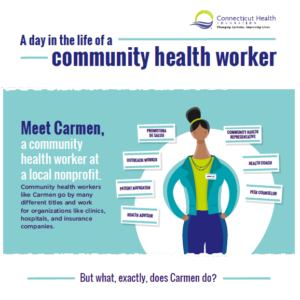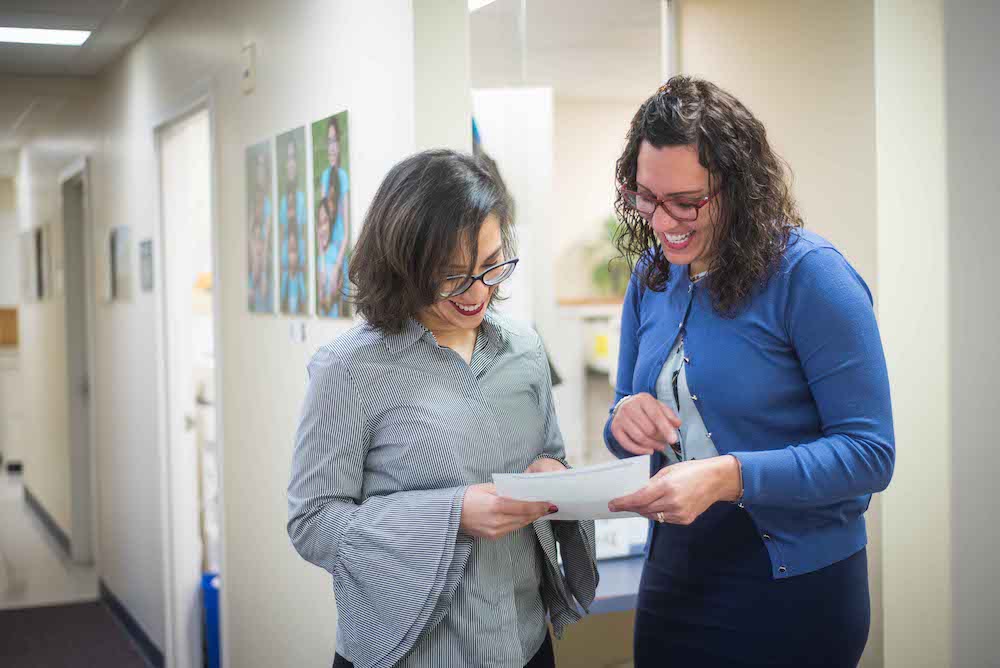Community health workers can play a vital role in improving health, reducing costs, and targeting health disparities. Here are some resources to learn more.
What is a community health worker?
Community health workers are frontline public health
workers who act as a bridge between their communities and the health care and social service systems. They build trusting relationships and learn about the lives of their clients, the resources and needs of their communities, and the barriers they face to being as healthy as possible.
Learn more:
Read our report, Understanding Community Health Workers: Who they are and why they matter for Connecticut
Watch our video, Community health workers: Reducing costs and disparities
Read the factsheet, What you need to know about community health workers
What do community health workers do?
 Community health workers are known by many different job titles and have a wide range of responsibilities. Their work can include helping patients navigate the health care and social service systems, providing support to new parents, connecting people to programs that can address their needs, and ensuring patients can follow their care plan.
Community health workers are known by many different job titles and have a wide range of responsibilities. Their work can include helping patients navigate the health care and social service systems, providing support to new parents, connecting people to programs that can address their needs, and ensuring patients can follow their care plan.
Learn more:
Check out our infographic, A day in the life of a community health worker
Who are community health workers?
 Community health workers are typically trusted members of a community or people who are able to build trusting relationships with patients. State and national surveys indicate that the vast majority of community health workers are women and most are people of color.
Community health workers are typically trusted members of a community or people who are able to build trusting relationships with patients. State and national surveys indicate that the vast majority of community health workers are women and most are people of color.
Learn more:
Read the stories of Connecticut community health workers:
>> Jacqueline Sanchez, patient navigator, Project Access-New Haven
>> Yaisa Burgos, breastfeeding peer counselor, Hispanic Health Council, Hartford
>> Loretta D. Lloyd-Ebron, SNAP grant coordinator and community health worker instructor, Housatonic Community College, Bridgeport
>> Milagrosa Seguinot, president, Community Health Workers Association of Connecticut, Bridgeport
How can they improve health and save money?
 Community health worker services can improve health outcomes by helping patients address non-medical issues that can influence their ability to get or stay healthy. For example, a community health worker could help a patient with diabetes learn to cook healthy meals or help the parents of a child with severe asthma learn how to keep their house free of asthma triggers.
Community health worker services can improve health outcomes by helping patients address non-medical issues that can influence their ability to get or stay healthy. For example, a community health worker could help a patient with diabetes learn to cook healthy meals or help the parents of a child with severe asthma learn how to keep their house free of asthma triggers.
Research shows that community health worker services can save money by leading patients to use more appropriate health care services or avoid the emergency department.
Researchers identified four models that could be implemented in Connecticut and achieve a positive return on investment. These include having community health workers focus on patients with type II diabetes, children with uncontrolled asthma, adults who frequently go to the emergency department, or adults with cardiovascular risk factors.
Learn more:
Read a brief on the four models, Community health workers: A positive return on investment for Connecticut
Read a report with detailed calculations, Sustainable financing models for community health worker services in Connecticut: Translating science into practice
What are other states doing?
Nearly every state is working on ways to better integrate community health workers into the health care system. One common approach is to create a certification process for community health workers, which can provide potential payers or employers with assurances that community health workers meet certain standards of training or experience.

